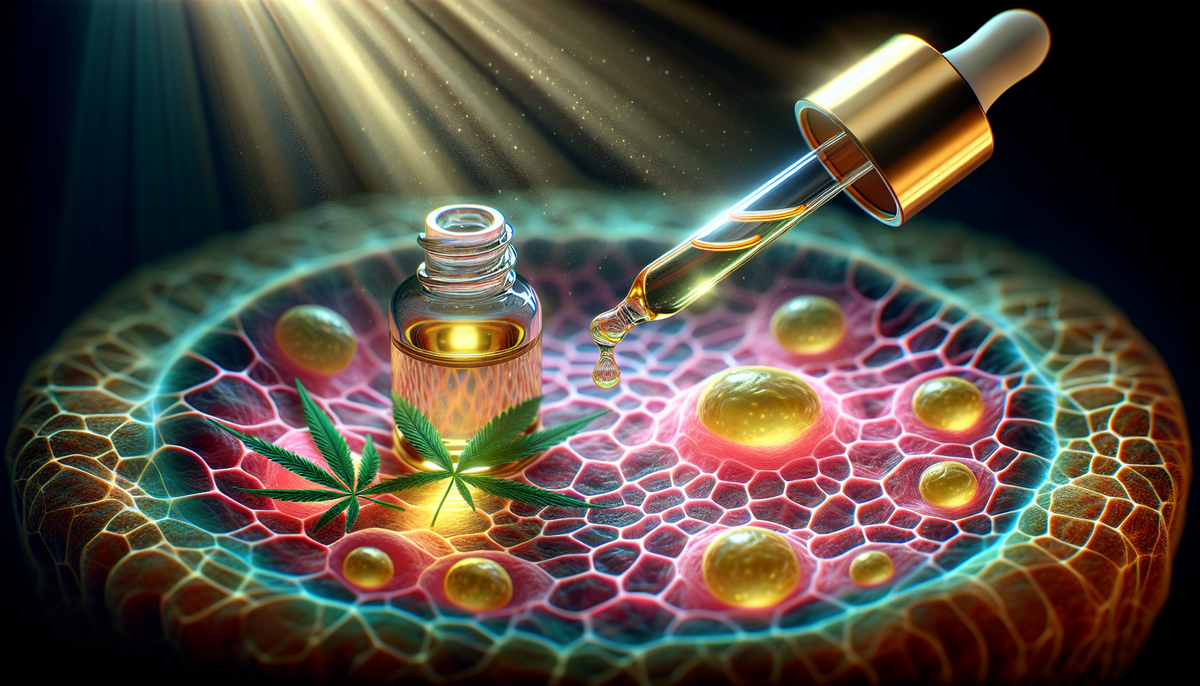Top 7 Hemp Oil Benefits for Health and Wellness
Written by: Hunter Podell, Subject Matter Expert and Website Founder
Published: March 15, 2024; Last updated: April 6, 2024
- 1. Key Takeaways
- 2. The Potential of Hemp Oil
- 2.1 The Essence of Hemp Seed Oil
- 2.2 Full Spectrum Hemp Oil vs. Hemp Seed Oil
- 3. Natural Pain Relief and Anti-Inflammatory Effects
- 3.1 Hemp Oil in Clinical Trials
- 4. Skin Health: More Than Just Surface Deep
- 4.1 Hempseed Oil Strengthens Your Skin
- 5. A Heart-Healthy Option: Cardiovascular Benefits of Hemp Oil
- 5.1 Omega Fatty Acids for a Healthy Heart
- 6. Hemp Oil for Brain Health
- 7. Balancing Hormones with Hemp Oil
- 8. Digestive Health Supported by Hemp Oil
- 9. Summary
- 10. Frequently Asked Questions
- 10.1 Does hemp oil make you sleepy?
- 10.2 What exactly is hemp seed oil, and how is it different from full spectrum hemp oil?
- 10.3 Can hemp oil really help with conditions like arthritis and chronic pain?
- 10.4 Is hemp oil good for my skin?
- 10.5 How does hemp oil support heart health?
- 10.6 References
Exploring hemp oil benefits? Extracted from Cannabis sativa seeds, hemp oil could be a valuable addition to your health regimen with its bounty of essential fatty acids and nutrients. Offering more than just superficial advantages, hemp oil has been associated with promoting skin health, supporting heart function, enhancing brain wellness, and may have natural anti-inflammatory effects. Let’s unpack how hemp oil might positively influence your overall well-being, all while being non-psychoactive.
Key Takeaways
Hemp seed oil offers significant health benefits due to its rich nutritional profile, including essential fatty acids, proteins, and minerals, while being distinct from full spectrum hemp oil which contains cannabinoids like CBD.
Hemp oil can act as a natural pain reliever and anti-inflammatory agent, with clinical trials demonstrating its effectiveness in conditions such as arthritis and multiple sclerosis, as well as promoting skin health by treating conditions like acne and eczema.
Ingesting hemp oil can support cardiovascular and brain health due to its high content of amino acids and omega fatty acids, which help regulate blood pressure, reduce cholesterol, and maintain cognitive function.
The Potential of Hemp Oil

The hemp plant, specifically the variety known as Cannabis sativa, is the source of a nutrient-dense oil extracted from its seeds. Revered for its health benefits, hemp seed oil is a testament to the plant’s robust nutritional profile, teeming with:
healthy polyunsaturated fatty acids
high-quality proteins
minerals
fibers
The rich history of the hemp plant spans thousands of years, and through time, it has earned its status as a superfood. This is not by chance; the composition of hemp oil speaks to its potential benefits and the reasons why it has been such an integral part of historical diets.
A closer look at hemp seed oil’s composition uncovers a harmonious blend of substances that collectively enhance bodily and mental health. The oil is an abundant source of essential amino acids and essential fatty acids, crucial building blocks for healthy development and immune system function. Commercial hemp seed oils are curated with a focus on quality, making sure they retain their nutritional value and are devoid of psychoactive substances. This ensures their suitability for a diverse audience looking to boost their health naturally.
Though ‘hemp oil’ is a term frequently used in a broad sense, it’s worth noting that not all oils derived from the hemp plant are identical. A discerning eye will note the distinction between hemp seed oil and full spectrum hemp oil—each offering unique benefits and considerations. Hemp seed oil, pressed from the seeds of the cannabis sativa plant, is especially rich in nutrients beneficial for skin health and cardiovascular function. In contrast, full spectrum hemp oil includes CBD and other cannabinoids, boasting a different set of potential therapeutic effects.
The Essence of Hemp Seed Oil
The extraction process of hemp seed oil intertwines traditional methods with technological advancements. Cold pressing, a method that preserves the nutritional value and purity of the oil, has gained popularity for its environmental friendliness and absence of toxic residues. While this method retains the oil’s high chlorophyll content, it demands careful handling to prevent oxidation. On the other hand, supercritical CO2 extraction represents the cutting-edge of oil extraction technology, yielding an exceptionally clean and high-quality oil that is especially desirable for both nutritional and pharmaceutical applications.
Quality control is a critical factor in producing commercial hemp seed oil. Studies reveal that these oils generally contain minimal concentrations of THC and CBD. This is indicative of high standards in processing, ensuring that the final product lacks psychoactive effects and remains true to the essence of the cannabis sativa plant. Such attention to detail underscores the commitment to delivering a product that strengthens the body without compromising its integrity.
Hemp seed oil offers a diverse and enriching nutritional profile, featuring a balance of linoleic and alpha-linolenic acids. These essential fatty acids are not synthesized by the human body and must be obtained through diet. Hemp seed oil offers an excellent source of these acids, contributing to the overall excellent nutritional value of the oil and making it a worthy addition to any health-conscious individual’s diet.
Full Spectrum Hemp Oil vs. Hemp Seed Oil
When exploring the depths of hemp-based oils, one must discern between the distinct offerings of full spectrum hemp oil and hemp seed oil. Full spectrum hemp oil, as the name suggests, encompasses a full range of cannabinoids, including CBD, which has attracted significant attention for its potential therapeutic benefits. However, one must tread carefully when consuming cannabinoids, as CBD could potentially have adverse effects and may interact with other medications.
Hemp seed oil distinguishes itself with its abundance of polyunsaturated fatty acids, which are well-known for their efficacy in soothing skin conditions like atopic dermatitis. This oil is a powerhouse for skin health, providing the essential nutrients necessary for maintaining a vibrant and resilient complexion. The absence of cannabinoids in hemp seed oil makes it a straightforward choice for those seeking the nutritional benefits of the hemp plant without the complexities associated with full spectrum oils.
Understanding the appropriate dosage is vital when considering full spectrum hemp oil as a supplement. Research suggests a safe consumption dose of CBD is up to 1–2 mg/kg, a guideline that underscores the importance of moderation and professional guidance.
By contrasting the cannabinoid-rich full spectrum hemp oil with the nutrient-focused hemp seed oil, consumers can make informed decisions that align with their health goals and personal preferences.
Natural Pain Relief and Anti-Inflammatory Effects

Hemp oil’s potential as a natural pain relief solution is anchored in its anti-inflammatory properties, chiefly due to the presence of gamma-linolenic acid (GLA) and alpha-linolenic acid (ALA). These compounds offer a botanical route to managing chronic pain and inflammation, presenting an alternative to conventional treatments that often come with a bevy of side effects. Individuals grappling with the discomfort of arthritis have found solace in hemp seed oil, which can be applied topically for targeted relief or ingested to address systemic inflammation.
The therapeutic potential of hemp seed oil includes:
Easing the symptoms of arthritis
Reducing inflammation throughout the body, which is a common pathway leading to various chronic diseases
Offering a protective effect that is both potent and natural
The presence of anti-inflammatory properties in hemp oil may not only reduce symptoms but also resist the progression of inflammatory conditions.
Hemp Oil in Clinical Trials
The efficacy of hemp oil in treating chronic pain is not merely anecdotal; it has been put to the test in the realm of clinical trials. Studies have produced results that span a spectrum, from those comparable to placebo to those indicating significant effectiveness, particularly in conditions like multiple sclerosis and spinal cord injuries. Such findings illuminate the potential of hemp oil as a multifaceted treatment for chronic pain, with scientific backing that lends credence to its use.
Clinical research has been instrumental in shaping our understanding of hemp oil’s role in pain management. With trials showing marked pain reduction in patients suffering from chronic pain conditions, hemp oil’s profile as a therapeutic agent is bolstered. These trials not only highlight the oil’s potential to alleviate suffering but also pave the way for more targeted studies that could unlock further health benefits of hemp.
Skin Health: More Than Just Surface Deep

The quest for healthy skin has led many to the doorstep of hemp seed oil, a substance whose polyunsaturated fatty acids are lauded for their skin-nourishing properties. Its therapeutic potential shines in the treatment of a variety of skin conditions, including:
acne
psoriasis
eczema
atopic dermatitis
The oil’s capacity to restore skin balance and prevent inflammation makes it a potent ally in combating challenging skin conditions.
Not only does hemp seed oil provide relief for existing skin conditions, but it also plays a proactive role in skin health. Through its anti-inflammatory effects and its capacity to strengthen the skin’s natural barrier, hemp oil supports the skin’s ability to resist infection and environmental stressors. This is more than just skin deep; it’s a holistic approach to maintaining a radiant and resilient complexion, fortified by the health benefits of hemp.
Hempseed Oil Strengthens Your Skin
The fortifying effects of hemp seed oil on the skin are attributed to its rich content of alpha-linolenic acid and linoleic acid. These essential fatty acids are the keystones of healthy skin cells, providing the foundation for a vibrant and youthful appearance. Hemp seed oil’s role in maintaining and regenerating skin cell health cannot be overstated, as it is integral to the skin’s overall well-being.
An arsenal of antioxidants, including vitamins A, C, E, and F, is encapsulated within hemp seed oil, offering a protective shield against the ravages of time. These antioxidants contribute to the oil’s ability to retain moisture within the skin, keeping it hydrated and reducing the signs of aging. Fine lines and wrinkles stand little chance against the rejuvenating power of hemp oil, which not only moisturizes but also enhances the skin’s elasticity.
The benefits of hemp seed oil for skin health are far-reaching, offering a natural solution to common skin issues. Its ability to strengthen and protect extends beyond mere cosmetic improvement, providing a therapeutic effect that is both preventive and restorative. With such compelling advantages, hemp seed oil strengthens its position as a staple in any skin care regimen, promising a healthier, more radiant complexion.
A Heart-Healthy Option: Cardiovascular Benefits of Hemp Oil

Incorporating hemp oil into our diet can significantly benefit our heart, our body’s essential pump. This oil, derived from plants, is rich in the amino acid arginine, a key player in producing nitric oxide. This crucial molecule is responsible for regulating blood pressure and keeping the blood vessels flexible, reducing the risk of heart disease. The cardiovascular health benefits of hemp oil are thus not only theoretical but are supported by the biological role of its components.
Cholesterol levels, those pesky indicators of heart health, can be positively influenced by the linoleic acid content in hemp seed oil. This fatty acid has been associated with lower total and LDL cholesterol levels, which are critical factors in maintaining a healthy heart. The implications of this are significant, as managing cholesterol is a cornerstone of preventing cardiovascular diseases.
Increasing arginine intake via hemp oil consumption can potentially lower C-Reactive protein levels, an inflammation indicator and a predictor of cardiovascular diseases. Moreover, hempseed’s potential to inhibit platelet aggregation could be a game-changer in preventing clot formation, reducing the likelihood of heart attacks and strokes. All these factors culminate in a compelling argument for hemp oil as a heart-healthy option.
Omega Fatty Acids for a Healthy Heart
A balanced ratio of omega-3 to omega-6 fatty acids characterizes the nutrient profile of hemp oil. This ratio, found naturally in hemp seeds, is considered ideal for a heart-healthy diet, potentially reducing the risk of chronic diseases. The omega fatty acids play a pivotal role in heart disease prevention and can assist in maintaining optimal blood pressure levels. Some benefits of hemp oil include:
Supporting heart health
Reducing inflammation
Improving skin conditions
Supporting brain health
Boosting the immune system
Incorporating hemp oil into your diet can provide these health benefits and more.
Beyond the balance of omegas, the specific fatty acids found in hemp seeds, such as gamma-linolenic acid and alpha-linolenic acid, contribute to a robust cardiovascular system. They do so by providing anti-inflammatory and anti-thrombotic properties, which can safeguard the heart against disease. Antioxidants and omega-3 fatty acids, working in tandem, offer a formidable defense against cardiovascular challenges.
The interplay between these fatty acids and heart health is complex, yet the evidence points to a clear conclusion: incorporating hemp seed oil into one’s diet can have profound effects on cardiovascular well-being. With the potential to lower cholesterol levels and support a healthy heart, the omega fatty acids in hemp oil are essential allies in the pursuit of heart health.
Hemp Oil for Brain Health

Venturing into the realm of cognitive wellness, hemp oil emerges as a valuable resource for brain health. Omega-3 fatty acids, essential components found in hemp seeds, play a crucial role in building brain cell membranes and providing anti-inflammatory benefits, both crucial for maintaining cognitive function. The significance of these fatty acids in brain health is underscored by their necessity for brain development and their role in preventing neurodegenerative diseases.
The body converts alpha-linolenic acid, an omega-3 fatty acid in hemp oil, into docosahexaenoic acid (DHA), a vital component of brain cells. DHA is known for its importance in early brain development and for maintaining cognitive function throughout life. This conversion process highlights the body’s remarkable ability to utilize the nutrients in hemp oil for brain health.
Moreover, eicosapentaenoic acid (EPA) is another omega-3 fatty acid that has been linked to mental health benefits, including the potential to prevent and treat conditions like depression and anxiety. The role of hemp oil in supporting brain health extends beyond its physical contributions, venturing into the realm of mental wellness, making hemp oil a comprehensive ally for the mind.
Balancing Hormones with Hemp Oil
Hemp seed oil’s nutritional profile is rich in polyunsaturated essential fatty acids, such as gamma-linolenic acid (GLA), which are known for their hormonal balancing and anti-inflammatory effects. These properties of hemp oil are particularly beneficial for individuals experiencing hormonal imbalances, such as those that occur during menopause and premenstrual syndrome (PMS).
GLA, by aiding the production of prostaglandin E1, can help mitigate the effects of prolactin, a hormone known to worsen PMS symptoms. By managing the effects of prolactin, hemp oil offers relief to those struggling with the discomforts associated with PMS. Furthermore, the anti-inflammatory properties of GLA can also reduce the inflammation experienced during menopause, providing a soothing effect on the body.
The benefits of hemp oil for hormonal balance are multifaceted, addressing specific issues such as PMS symptoms and menopausal discomfort. By leveraging its anti-inflammatory properties, hemp oil not only eases these symptoms but also contributes to an overall sense of well-being, making it a valuable addition to a holistic approach to hormone health.
Digestive Health Supported by Hemp Oil
Digestive health is yet another domain where hemp oil exerts its influence, particularly when derived from whole hemp seeds. The high fiber content of these seeds can aid in weight management, prevent constipation, and contribute to lower cholesterol levels. Thus, hemp oil products made with whole hemp seeds offer a more comprehensive package of digestive health benefits.
The majority of the fiber in hemp seeds is contained within their hulls, which is why whole hemp seeds surpass their shelled equivalents in terms of fiber content. This distinction is important for those looking to enhance their digestive health, as fiber plays a crucial role in maintaining a healthy digestive system.
Given that shelled hemp seeds contain little fiber, it is advantageous to choose hemp oil products that incorporate whole hemp seeds. Doing so ensures that one can reap the full digestive health benefits that shelled hemp seeds have to offer, making them an excellent choice for those seeking to support their digestive system naturally by eating hemp seeds.
Summary
As we reach the end of this enlightening exploration, it’s clear that hemp oil is more than a mere supplement; it’s a versatile, natural ally in our quest for health and wellness. The evidence is compelling: from the anti-inflammatory and pain-relieving properties that offer solace to those with chronic pain to the skin-nourishing benefits that promise a radiant complexion, hemp seed oil emerges as a beacon of holistic health. The heart-healthy fats, brain-boosting omega-3s, and hormone-balancing GLA present in hemp oil underscore its potential to support a wide range of bodily functions, making it a powerful addition to any health-conscious individual’s regimen.
Embracing hemp oil is not only about tapping into ancient wisdom; it’s also about making informed choices in a modern world brimming with health options. As with any natural product, quality and purity are paramount, and understanding the differences between hemp seed oil and full spectrum hemp oil is crucial. This guide has equipped you with the knowledge to navigate the world of hemp oil confidently, and hopefully, inspired you to incorporate this superfood into your life for enhanced well-being and vitality.
Frequently Asked Questions
Does hemp oil make you sleepy?
No, hemp oil does not make you sleepy. Feel free to incorporate it into your daily routine without concern for drowsiness.
What exactly is hemp seed oil, and how is it different from full spectrum hemp oil?
Hemp seed oil is extracted from the seeds of the Cannabis sativa plant and lacks cannabinoids like CBD. Full spectrum hemp oil, however, contains CBD and other cannabinoids, offering a different set of potential therapeutic effects.
Can hemp oil really help with conditions like arthritis and chronic pain?
Yes, hemp oil can help manage chronic pain and inflammation due to its anti-inflammatory properties, including gamma-linolenic acid (GLA) and alpha-linolenic acid (ALA). Multiple clinical trials have reported significant pain reduction in patients with chronic conditions.
Is hemp oil good for my skin?
Yes, hemp oil is good for your skin as it contains polyunsaturated fatty acids that can balance the skin, prevent inflammation, treat conditions like acne, eczema, and psoriasis, as well as strengthen the skin’s barrier and reduce signs of aging.
How does hemp oil support heart health?
Hemp oil supports heart health by containing amino acids that aid in the production of nitric oxide, helping to regulate blood pressure and reduce the risk of heart disease, as well as providing a balanced ratio of omega-3 to omega-6 fatty acids, and linoleic acid linked to improved cardiovascular health.
References
Claro-Cala CM, Grao-Cruces E, Toscano R, Millan-Linares MC, Montserrat-de la Paz S, Martin ME. Acyclic Diterpene Phytol from Hemp Seed Oil (Cannabis sativa L.) Exerts Anti-Inflammatory Activity on Primary Human Monocytes-Macrophages. Foods. 2022 Aug 7;11(15):2366. doi: 10.3390/foods11152366. PMID: 35954130; PMCID: PMC9367727.
https://www.ncbi.nlm.nih.gov/pmc/articles/PMC9367727/
Cerino P, Buonerba C, Cannazza G, D’Auria J, Ottoni E, Fulgione A, Di Stasio A, Pierri B, Gallo A. A Review of Hemp as Food and Nutritional Supplement. Cannabis Cannabinoid Res. 2021 Feb 12;6(1):19-27. doi: 10.1089/can.2020.0001. PMID: 33614949; PMCID: PMC7891210.
https://www.ncbi.nlm.nih.gov/pmc/articles/PMC7891210/
Rodriguez-Leyva D, Pierce GN. The cardiac and haemostatic effects of dietary hempseed. Nutr Metab (Lond). 2010 Apr 21;7:32. doi: 10.1186/1743-7075-7-32. PMID: 20409317; PMCID: PMC2868018.
https://www.ncbi.nlm.nih.gov/pmc/articles/PMC2868018/

Written by Hunter Podell - Subject Matter Expert and Website Founder
Hunter has 8+ years of experience as a content writer and digital marketer. Earning his chops marketing in the healthcare space for over 5 years, Hunter is extremely familiar with the rules and regulations required to deliver high quality content that answers the user's needs while adhering to strict guidelines.
Join the CBDeals Club!
Get 10% off your first order and receive our best and exclusive promotions directly to your inbox!



